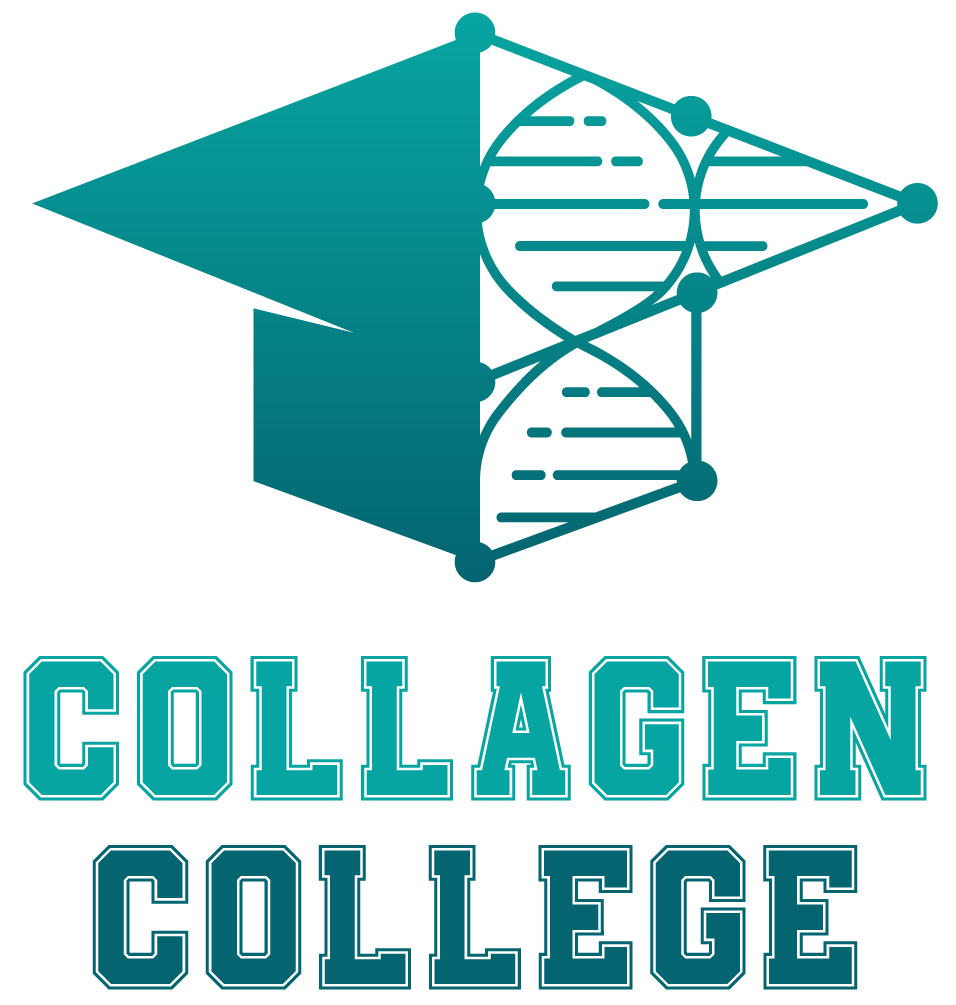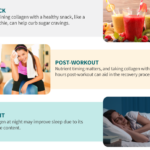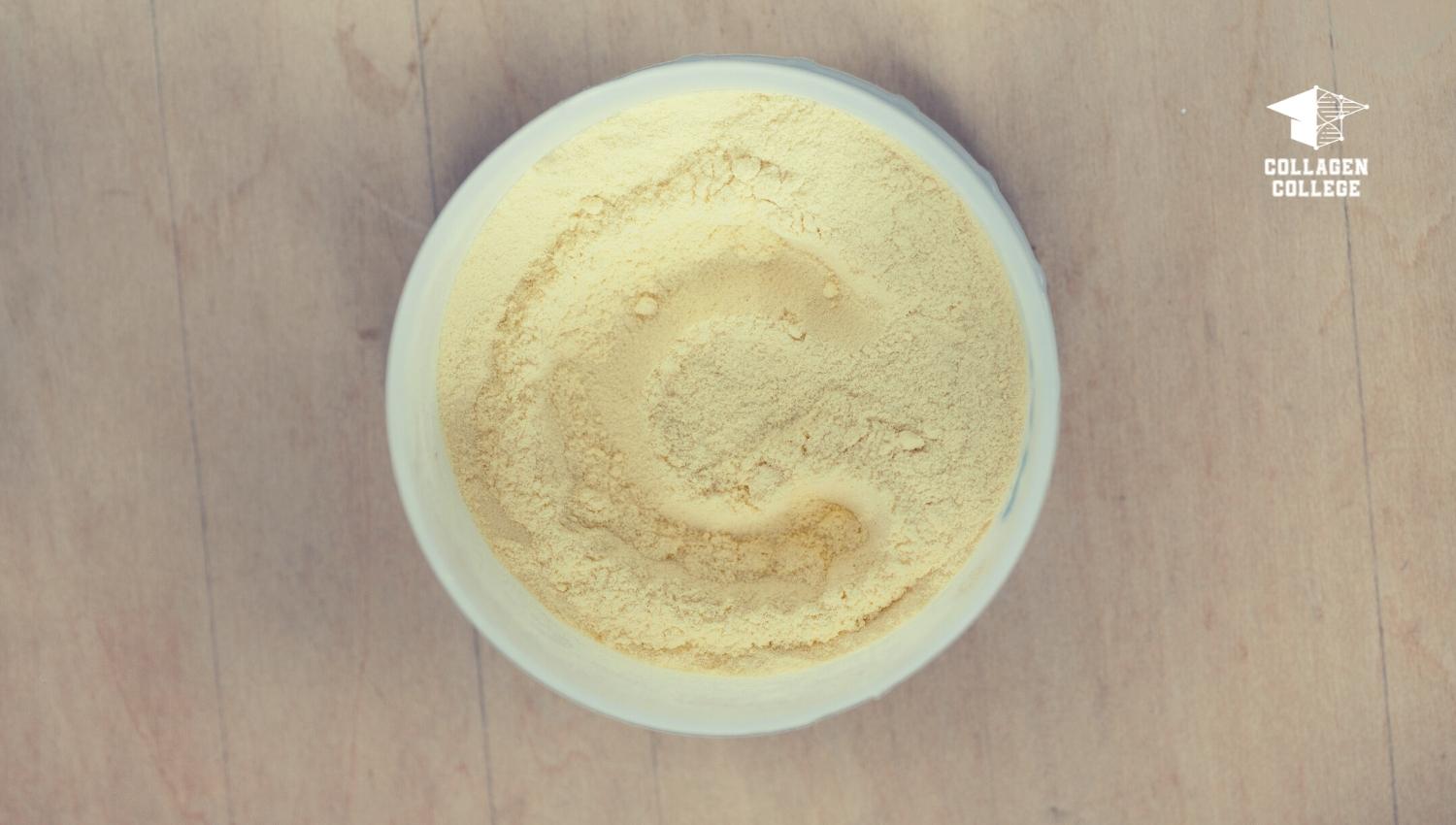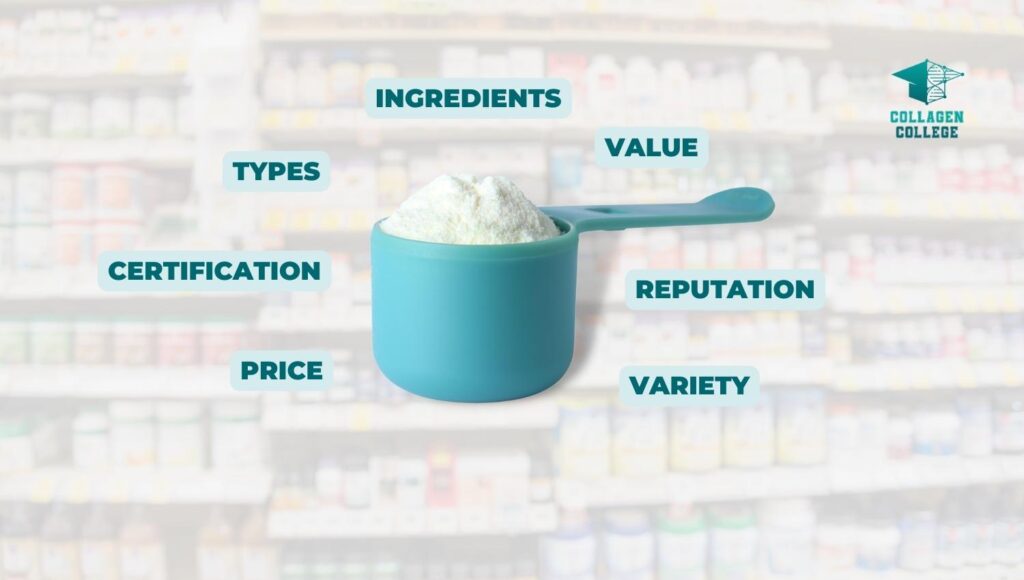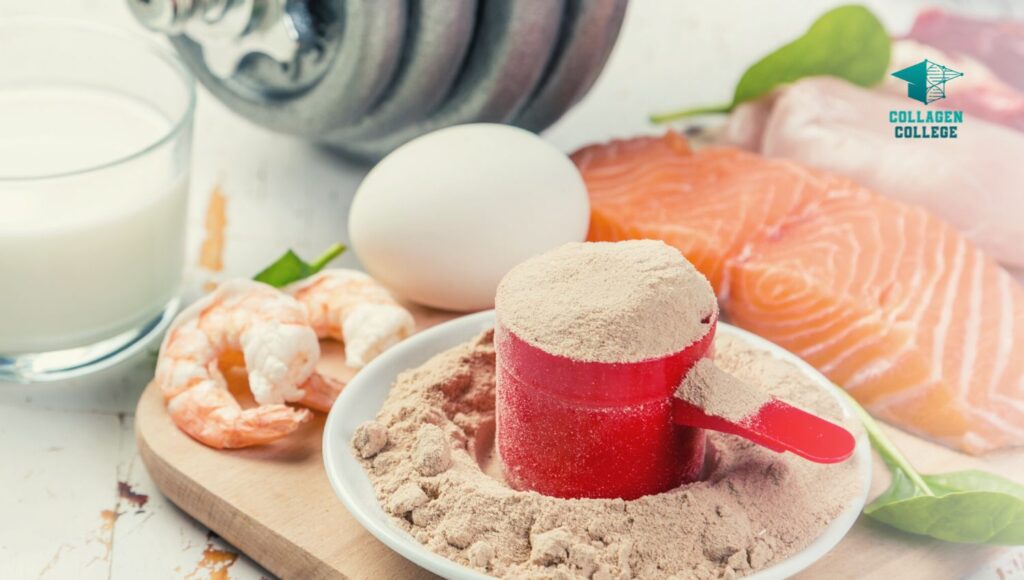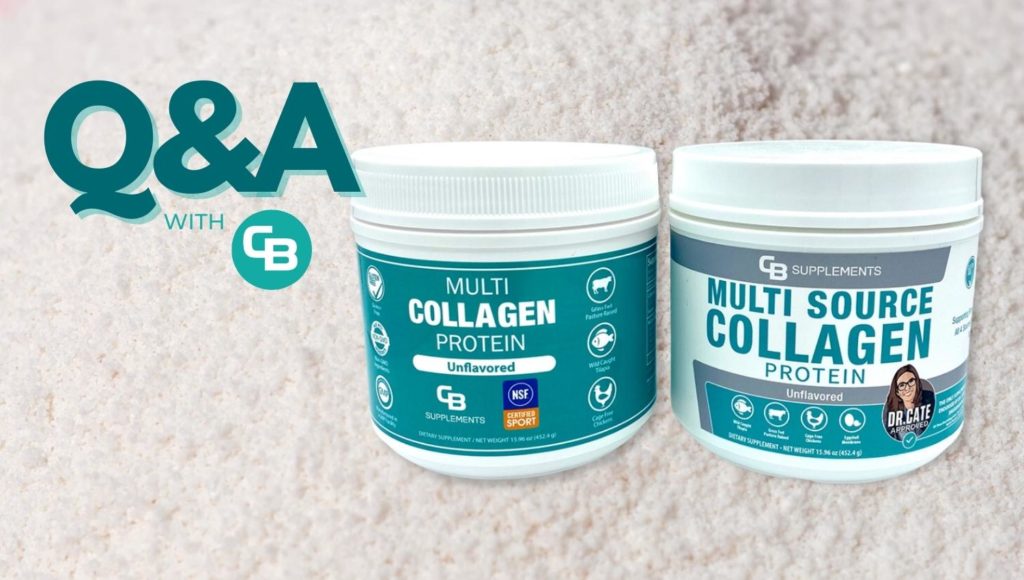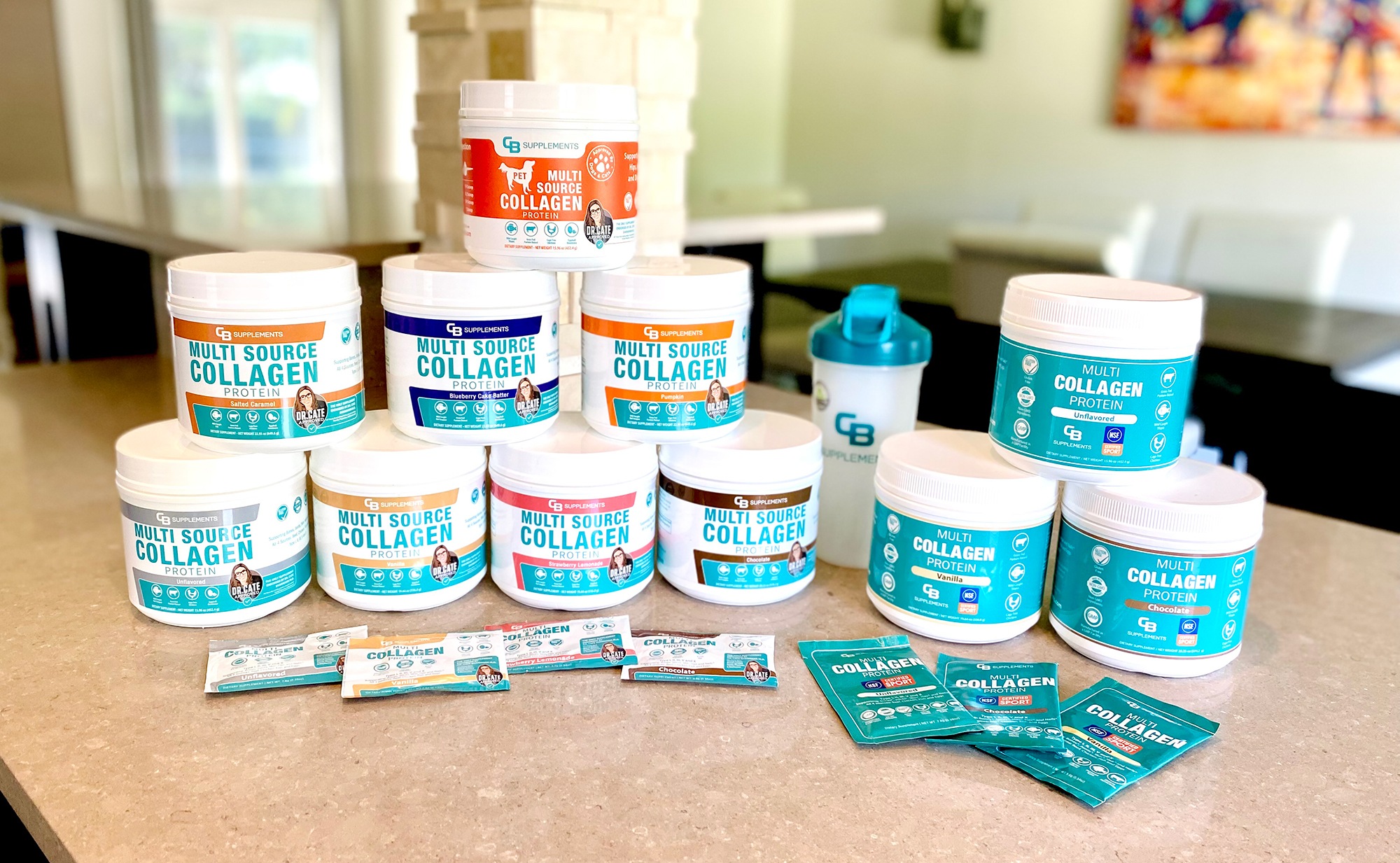You’ve probably already bought into collagen.
If not, here are the pros and cons of taking collagen.
Maybe you’re even enjoying a scoop of collagen powder with your morning coffee, smoothie, or tea at this very moment and wondering:
When is the best time of the day to take my collagen?
— You
Am I maximizing my collagen consumption by taking it in the morning? Should I have mixed it with my whey post-workout instead? What if I waited till bedtime? (since collagen is loaded with the amino acid glycine — which helps with sleep). Or, maybe I should take my collagen with vitamin C-rich food for better absorption? Should my stomach be completely empty? What if I’m fasting? Ugh.
Breathe, people.
Stevie Wonder, can we get some help here?

No need to fret. This is pretty straightforward!
What Science Says about When to Take Collagen
There’s a ton of science around collagen.
However, there’s no conclusive evidence proving there’s an ideal time of the day to take collagen peptide supplements. We’d love to look incredibly smart and say otherwise, but that’s just the facts y’all.
- Morning coffee?
- Noon?
- 2:44 pm?
- Before bedtime?
- While eating pizza? Mmm, pizza.
(shrugs shoulders)
So why don’t we have these controlled studies? Well, collagen is complex. Let’s talk fibroblasts.
The magic of Fibroblasts
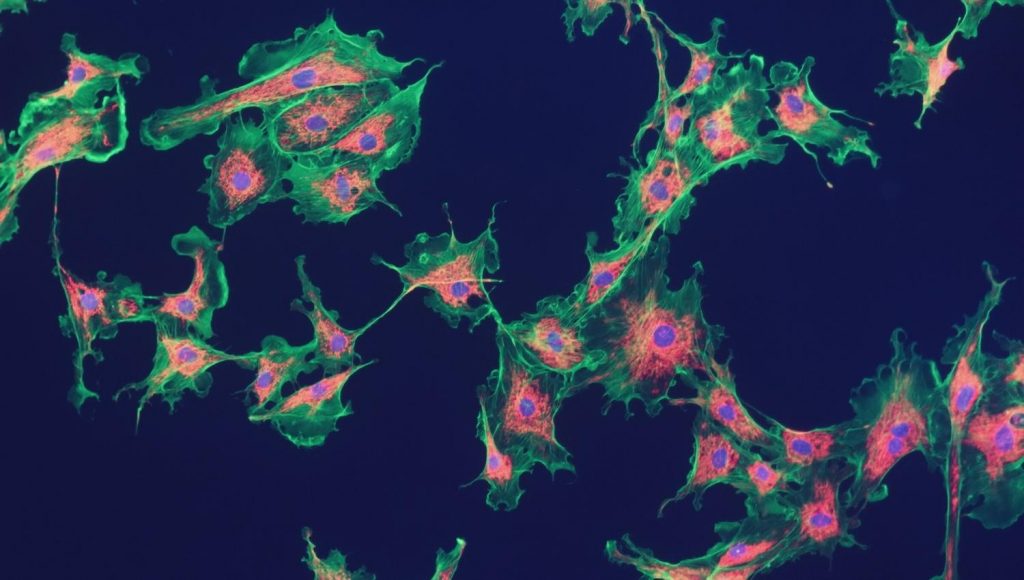
Our bodies produce more collagen via fibroblasts. These cells are “developmentally programmed to produce collagen matrix, which is the main structural component of connective tissue”, per NCBI. As you can imagine, this is a radically complex process.
Optimizing a complex process like stimulating fibroblast cells to make more collagen in all your collagenous tissues requires just about every nutrient there is.
— Dr. Cate, M.D.
There’s just no scientific evidence (yet) showing how fibroblasts are directly impacted in the collagen production process when consuming your morning coffee and collagen, or collagen-infused nighttime tea. We will someday. But, the study of collagen is still in its infancy. If you take your collagen peptides at 2:44 pm, there’s no proof your body does something magical than that otherwise, it wouldn’t have done if you took it at 9:44 pm.
OK, enough about science. Let’s hit the other end of the spectrum.
Common Claims & Myths
Now that you know science doesn’t prove or disprove the ideal time to take collagen, let’s address some myths quickly. Here’s a short list (more so my favorites) of some common claims:
- Taking collagen in the morning will help those creaky joints faster!
- Using collagen as a protein snack will fill you up before dinner!
- Take collagen with vitamin C for better absorption!
- Drinking hot tea and collagen at night will help you sleep better!
- If you take a scoop of collagen at 7:30 am, your skin will look better before your Hinge date at 7:30 pm!
OK, the last one is made up. And I could keep going. But, you get it.
Collagen is awesome and we do recommend taking 10g-40g of collagen every day (even though there’s no RDA), but all these bogus claims above have zero evidence. We’ll continue peeling back this onion to understand these conversations better. Fun fact: collagen is NOT found in onions (or any vegetable).
Should I take Collagen everyday?
It’s no coincidence that one of our two lines of collagen powders is named Every Day (see those products here). We believe that collagen can and should be taken every day, it’s that important.
Some, like Dr. Cate and Mark Sisson, even suggest that collagen should be considered its own food group it’s that important. So, find a way to eat collagen, every single day!
You should take collagen every day because your body is made up of collagen (1/3 of its protein composition) and reliant on collagen — it’s the glue that holds us together. At age 25-30, your body’s collagen production starts to sputter. By 40, we start to lose 1% every year. When you eat collagen, from foods and/or supplements, you stimulate fibroblast cells (discussed above) which are responsible for the complex process of collagen production — scientific evidence proves this. When you eat collagen, every day, you’re replenishing your body’s collagen on a regular basis, which is a great habit to start and continue.
But, when exactly? Let’s dig into the timing of taking collagen.
Best Times of the Day

Since we’re talking about “when”, it seems easiest to break this down by the time of the day:
Let’s start with the part of the day that comes loaded with polarizing nutrition and health opinions — the morning.
Taking Collagen in the Morning

Collagen and coffee in the morning is wildly popular and totally a thing! However, it’s certainly not a requirement to enjoy all of collagen powder’s benefits.
Collagen is a protein. And just like any other protein source, there can be certain advantages (e.g. managing blood sugar, weight loss, etc.) to taking protein during specific times of the day as you plan your meals and overall eating schedule. Is taking collagen protein in the morning going to help you with those things? Probably. Will the collagen your body ingests with that hot cup of coffee be more effective if you save it for the evening? There is no reason whatsoever to believe that would be the case. “Doing a study to answer that question would be expensive and pointless”, adds Dr. Cate.
Taking Collagen as a Snack
Snacks!
Again, collagen is protein. And we all know by now that protein helps you feel fuller (science does prove this). When it comes to snacks, I think we’re all looking to grab something high in protein. Is collagen the best option?
Taking collagen as a snack is less about the actual collagen and more about the vehicle/delivery method. On its own, collagen is just amino acids. It’s void of muscle meat, which we explored in how collagen peptides are made. To suggest collagen, on its own, will help you get through an afternoon crash is a big stretch. However, if you take collagen powder with, let’s say, a small smoothie (or anything with healthy fats and fiber) — that’ll certainly help avoid those sugar cookies piled up in the breakroom.
Taking Collagen Post-Workout
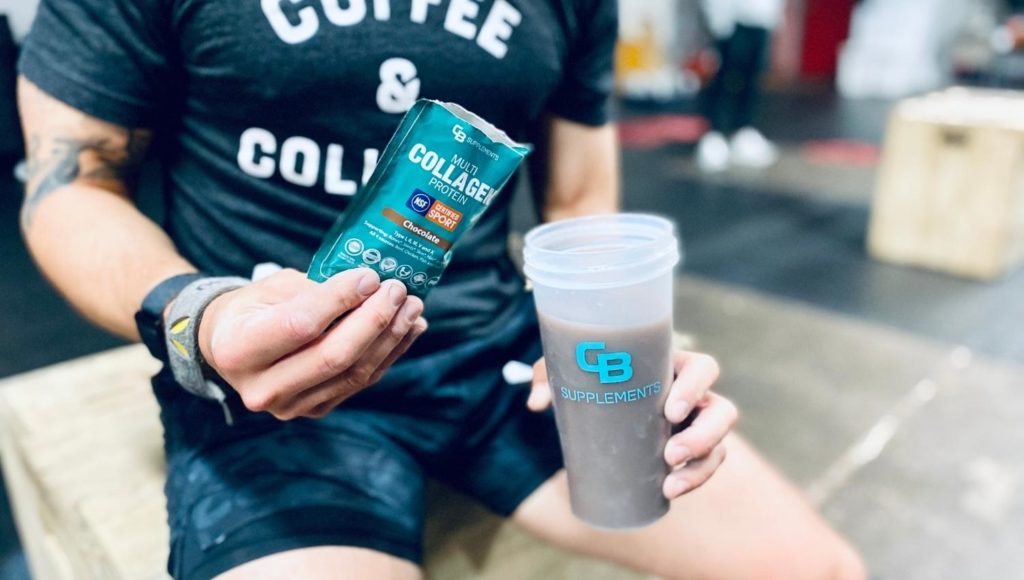
Some studies claim the benefits of taking whey protein right after a workout. Some, even say there’s a 30-minute window post-workout that’ll maximize the “anabolic window”. Nutrient timing is no doubt a thing, but it is polarizing, and we’re not here to debate that.
But, should collagen be taken directly after a workout? Possibly. If Dr. Cate had to choose a part of the day to take a collagen powder supplement, she’d recommend it after a workout.
Working out creates a hunger in your connective tissues. Though not required immediately post-workout, collagen-rich foods or supplements can help the recovery process if taken within a few hours after.
— Dr. Cate, M.D.
If your interest was piqued when mentioning whey above, be sure to check out Collagen Protein vs Whey Protein.
Taking Collagen at Night

Sleep. Who doesn’t want better sleep? And does taking collagen at night have any merit? Maybe.
Collagen powder is loaded with amino acids, glycine in particular. Every scoop of our multi collagen protein supplements will be loaded with glycine. Glycine has been proven to enhance sleep. However, if you break down the timing here, the impact on your REM and SWS (slow-wave sleep) just doesn’t align.
For example, let’s say you have your nightly tea with a scoop of unflavored collagen powder. After drinking, this collagen-infused tea needs to make its way through the digestive tract first before your cells have the opportunity to use it. “This absorption process usually takes between three and six hours after eating”, states LiveStrong. Basically, your sleep could be 2/3 over (maybe completely) by the time your body is ready to utilize this collagen.
Take collagen at night because collagen is a general “in-your-system” type of supplement. Not because you want 8 hours of restful sleep.
3 years of benefits!
"Been using this multi collagen for 3 years and continue to experience positive benefits!"
- Michael (Winter Park, FL)
✔
Purity Tested
✔
M.D. Approved
✔
Delicious Flavors
Taking Collagen with/on/for…
Now that we’ve discussed the “best” times of the day to take collagen, let’s talk about this notion of needing to take collagen with something, on something, or for something.
- With Vitamin C
- With Hot Liquids
- On an Empty Stomach
- For Weight Loss
Let’s start with the notion that you need to take collagen with vitamin C.
Taking Collagen with Vitamin C
Vitamin C does not actually improve collagen absorption.
“There’s no need to eat extra C or to consume C with collagen for this system to work. What you need is a well-balanced diet”, says Dr. Cate, M.D.. Most people get enough Vitamin C from a balanced diet. Unless you’re eating Oreos and pizza all day erryday or have a vitamin C deficiency, don’t worry about adding collagen powder to OJ or blending up red peppers with your collagen smoothie. It’s really inconsequential.
Taking with Hot Liquids
Don’t believe the lies that collagen loses its effectiveness in hot liquids. I mean, come on, would we make Coffee & Collagen t-shirts if that were the case? 🙂 Heat does not destroy collagen powder. It also isn’t the silver bullet to collagen effectiveness.
Rather, hot liquids are simply an excellent vehicle for collagen powder. It helps dissolve the powder quickly and provides a variety of ways to take it (coffee, tea, latte, hot chocolate, etc.). Here are the best ways you can take collagen powder.
Taking Collagen on an Empty Stomach
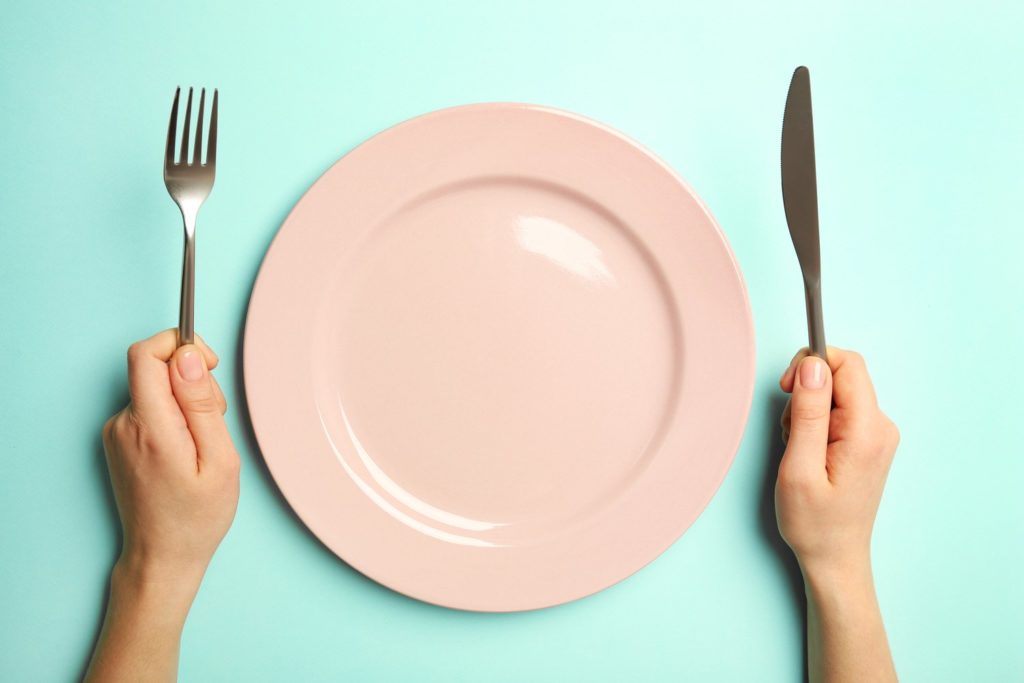
Should you take collagen on an empty stomach? You can if you want. But, your stomach doesn’t need to be empty to take collagen.
After all, if collagen is food (and it almost is), then your stomach won’t technically be empty after you take it.
Collagen powder is partly digested, that’s what hydrolyzed means. It’s broken down from a very long string of amino acids into short little snippets, some of which can be absorbed without any further breaking down. “Because collagen powder is partly digested, you don’t need to have your digestive enzymes ramped up to full capacity”, says Dr. Cate.
However, some of the longer peptides still need to be broken down further before your body will absorb them. “I would think most people’s systems would be able to pull that off. If not, they might theoretically experience some kind of bloating, at worst”, explains Dr. Cate.
Weight Loss
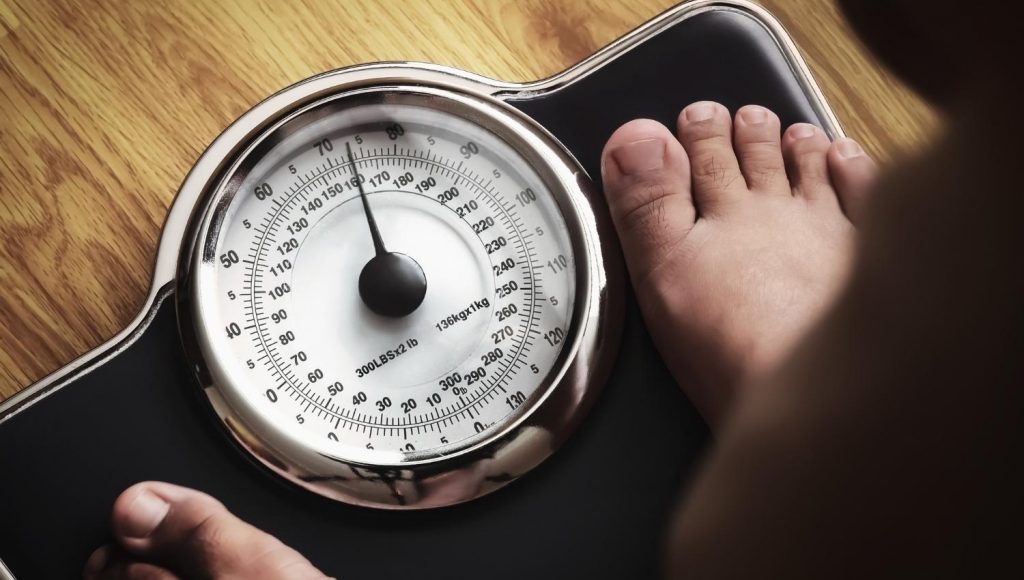
Is there a best time to take collagen for weight loss?
Collagen is not a silver bullet for your health goals, and that includes weight loss. It’s part of the equation.
Collagen is part of a healthy diet. And a healthy diet plus a healthy metabolism is the key to weight loss.
— Dr. Cate, M.D.
Yes, collagen is a protein. And studies show that high-protein diets promote satiety. When you’re fuller, more often, that could aid in weight loss by reducing your caloric intake. However, collagen by itself, will not promote satiety. It’s more about the vehicle in which you take the collagen (e.g. smoothie, yogurt, baked good) that’ll impact satiety.
The takeaway here is there’s little to no impact on trying to perfectly time your collagen intake to lose weight. To reiterate Dr. Cate, fixing your diet and metabolism (by avoiding seed oils) is the key to weight loss — not taking a scoop of collagen daily at 9:54 am.
I take most of my collagen in the morning with my coffee. In those multiple cups of coffee and collagen, I also add healthy fats with half and half cream and grass-fed butter. Has this morning routine helped me avoid croissants, donuts, cereal, toast, [insert processed carbohydrate here], and take in fewer calories? For sure. But, the collagen I add to my coffee concoction simply aids my weight management and overall healthy diet — it’s not solely responsible for it.
Final Thoughts
When’s the best time to take collagen? How about right now?
Stop worrying about the timing of collagen supplementation, and start focusing on getting more collagen in your diet.
Science continues to study and explore all things collagen. And though we don’t have a specific study saying it’s better to take collagen in the morning vs night, we do know that collagen consumption, in general, has an array of health benefits.
Anytime is a good time to take collagen. Go and enjoy!
